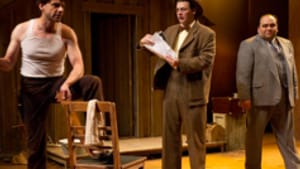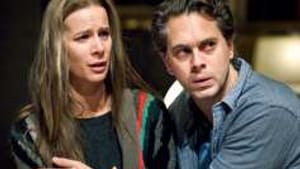Theater
2829 results
Page 208

Bruce Graham's "Mr. Hart and Mr. Brown' at People's Light
Ties that bind
Bruce Graham's Mr. Hart and Mr. Brown imagines an encounter between two men fleeing from their past in 1920s Nebraska.
Articles
2 minute read

Suffering for art: An actress speaks
Passion, pain, art and money: In defense of suffering artists
Is suffering for art ultimately a romantic but masochistic notion? As an actress, I disagree with BSR's Jackie Atkins. Artists don't measure our success by the material rewards. And we shouldn't.
Articles
4 minute read

"Once': A musical about nothing, on Broadway
Calling Jerry Seinfeld
Other critics have praised the Broadway musical Once for its love story, its great songs and its compelling characters— all elements that I found lacking.
Articles
2 minute read

"Other Desert Cities' and "My Children! My Africa!'
Political protest and its unintended consequences
In two powerful plays about political protest— in the Vietnam-era U.S. and apartheid South Africa— everyone pays a price for discord between the generations.
Articles
6 minute read

Bright Light's "The Fifth Floor'
Standing room only
Why didn't Shakespeare think of this? The Fifth Floor is a drama performed entirely in an elevator, complete with real (albeit unsuspecting) passengers who have no idea what they've stumbled into.
Articles
4 minute read

"Harvey' on Broadway
Rabbit on a slippery slope
Long before the American theater of the absurd, Mary Chase's Harvey offered useful lessons about the value of an active imagination as a survival tool in an absurd world.
Articles
5 minute read

Lantern's "The Island' (4th review)
Incarceration, Inc.
The Island, Athol Fugard's co-authored play about prisoners on South Africa's infamous Robben Island, is both historically dated and timelessly relevant— especially to America's own carceral society, and our own political prison at Guantanamo Bay.
The Island. By Athol Fugard, John Kani and Winston Ntshuma; Peter DeLaurier directed. Closed June 10, 201 at the Lantern Theater, 923 Ludlow St. (215) 829-0395 or www.lanterntheater.org.
Articles
5 minute read

"Angels in America' at the Wilma
Angels, beyond AIDS
Now that AIDS is no longer immediately fatal, the original theme of Angels in America isn't as shocking. Instead we look to it for broader themes, which Tony Kushner's script fortunately provides. It's funny, too.
Articles
3 minute read

LaBute's "reasons to be pretty' by PTC
Beautiful but miserable
Like its predecessors in Neil LaBute's trilogy, reasons to be pretty throws together four insecure young people with hangups about beauty and their friends' opinions.
Articles
3 minute read

Tony Kushner's "A Dybbuk,' by EgoPo
Sympathy for our devils
Tony Kushner's adaptation of The Dybbuk concerns unrequited love among Hasidic Jews in Eastern Europe. But mysticism is only part of this tale: The story works for skeptics as well as for believers, and for non-Jews as well.
Articles
4 minute read